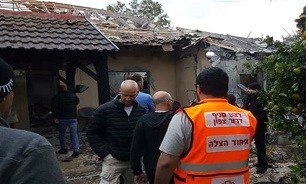Area near Tel Aviv Hit by Long-Range Rocket
 The early morning attack on Mishmeret, an agricultural town north of Tel Aviv, came a day after Israeli warplanes bombed the besieged enclave ahead of the anniversary of Gaza fence protests at the weekend.
The early morning attack on Mishmeret, an agricultural town north of Tel Aviv, came a day after Israeli warplanes bombed the besieged enclave ahead of the anniversary of Gaza fence protests at the weekend.
It forced Israeli Prime Minister Benjamin Netanyahu to cut short his trip to Washington immediately after meeting US President Donald Trump later on Monday, his office said.
The Palestinian Information Center reported that two missiles struck the heart of the Israeli-occupied territories early on Monday. The attack reportedly destroyed a building, leaving seven settlers injured.
Sirens sounded in central Israel for the first time in two years and residents reported an explosion, highlighting the failure of Israel's much-hyped Iron Dome missile system to intercept the rocket.
The multi-billion-dollar system was dealt another blow during the latest military flare-up in November, when Hamas fired more than 460 rockets at the occupied lands in less than 24 hours in response to Israeli aggression.
Tel Aviv and outlying towns had last come under such an attack during the 2014 war on Gaza. A week and a half ago, two rockets were fired at Tel Aviv from the Gaza Strip but the Israeli military said they had been launched accidentally.
Netanyahu, who is seeking a fifth term in next month's ballot, has been in Washington for the annual AIPAC conference.
"In light of the security events I decided to cut short my visit to the US," Netanyahu said as he pledged a strong "response" to the rocket attack.
His office said Netanyahu has been updated on the rocket fire, and that he has called for a consultation with chiefs of the Israeli military, Shin Bet and other senior security officials via telephone.
On Sunday, Israeli tanks shelled Gaza after "incendiary balloons" were launched across the fence throughout the evening, the military said. The day before, Israeli warplanes struck southern Gaza Strip.
Tensions have been running high in Gaza since March 30, when the "Great March of Return" protests started, demanding the right to return for those driven out of their homeland by Israeli aggression.
The clashes in Gaza reached their peak on May 14, the eve of the 70th anniversary of Nakba Day or the Day of Catastrophe, which coincided this year with Washington’s relocation of its embassy from Tel Aviv to the occupied Jerusalem al-Quds.
More than 260 Palestinians have so far been killed and at least 26,000 others wounded in the Gaza clashes, according to the Gaza Health Ministry.
Gaza has been under Israeli siege since June 2007, which has caused a decline in living standards. Israel has launched three major wars against the enclave since 2008, killing thousands of Gazans each time and shattering the impoverished territory’s already poor infrastructure.
Message end/
